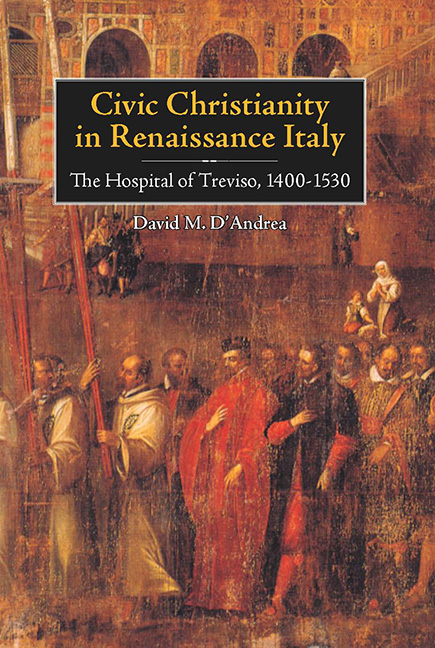Book contents
- Frontmatter
- Contents
- List of Illustrations
- Acknowledgments
- List of Abbreviations
- Notes to the Reader
- Introduction
- Chapter 1 The City of God
- Chapter 2 The Confraternal Family
- Chapter 3 The Bonds and Bounds of Charity
- Chapter 4 Medical Care and Public Health
- Chapter 5 Instruction for This Life and the Next
- Chapter 6 Crisis and Reform
- Notes
- Bibliography
- Index
Chapter 1 - The City of God
Published online by Cambridge University Press: 08 April 2017
- Frontmatter
- Contents
- List of Illustrations
- Acknowledgments
- List of Abbreviations
- Notes to the Reader
- Introduction
- Chapter 1 The City of God
- Chapter 2 The Confraternal Family
- Chapter 3 The Bonds and Bounds of Charity
- Chapter 4 Medical Care and Public Health
- Chapter 5 Instruction for This Life and the Next
- Chapter 6 Crisis and Reform
- Notes
- Bibliography
- Index
Summary
The tyrant . . . prohibits congregations and assemblies, so that men will not form friendships among themselves, out of fear that they will conspire against them.
—Girolamo Savonarola
Having seen in the growth of the Great Hospital, the creation of a new city built on religious mercy, which one could call the City of God, the universal Council of the City of Treviso resolved with a generous spirit to leave it free; thus having an independent Government, the hospital enjoyed in civil liberty the prerogatives equal to its noble purpose.
—Domenico Vettorrazzi
The Dominican friar Girolamo Savonarola, preaching in the 1490s, and the Trevisan chronicler Domenico Vettorrazzi, writing in 1681, recognized the ennobling character of free association and self-governance. Congregations and assemblies fostered independent action and political control, which tyrannical governments perceived as a threat to their power. Just rulers, however, rewarded citizens for their good works by granting them civic liberty. When the self-governing bodies and organizations of Treviso fell under the control of Venetian rulership, the independent activity of the communal deliberative bodies, the official expressions of public power, were stifled. The confraternity of Santa Maria dei Battuti and its hospital, however, continued to assert their statutory independence and were left remarkably free to govern themselves. Through the control of its financial endowment, physical infrastructure, and organization of processions, the Battuti acted as a surrogate for local political power in the city. As Venetian domination restricted political participation and limited the independence of communal bodies, a default commune, Vettorrazzi's city within a city, rose in the form of the confraternity of Santa Maria dei Battuti and its hospital.
The Great Devotion of 1260, an offshoot of the Franciscan penitential preaching begun by Raniero Fasani in Perugia, spread throughout the Italian peninsula. Preaching penance, social harmony, and brotherhood, the movement gained a large following. Many flagellant confraternities, including the Scuole Grandi of Venice and the Battuti of Treviso, were founded in its wake. The confraternal statutes of 1329 credit Bishop Alberto de’ Ricchi with the foundation of the Battuti in Treviso. In the midst of political struggles between imperial and papal powers, Bishop Ricchi welcomed the Flagellants into the city as a movement of peace and concord.
- Type
- Chapter
- Information
- Civic Christianity in Renaissance ItalyThe Hospital of Treviso, 1400–1530, pp. 13 - 38Publisher: Boydell & BrewerPrint publication year: 2007

